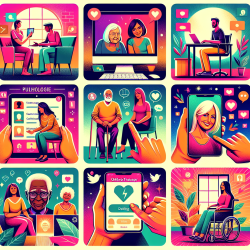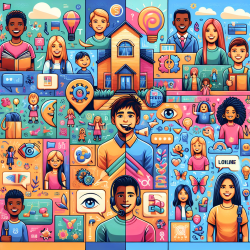Introduction
In today's digital age, technology is reshaping how we connect and interact with one another. The research paper titled OK Cupid, Stop Bumbling around and Match Me Tinder: Using Dating Apps Across the Life Course explores the role of dating apps in enhancing social connectedness among older adults and young people with life-limiting or life-threatening conditions (LLTCs). This blog aims to highlight key findings from the research and discuss how practitioners can leverage these insights to improve outcomes for vulnerable populations.
Understanding the Role of Dating Apps
The research emphasizes that dating apps offer a platform for social interaction and intimacy, which are crucial for mental and emotional well-being. For older adults, these apps can combat loneliness and social isolation, while for young individuals with LLTCs, they provide a means to explore relationships and sexuality in a safe environment.
Key Findings and Implications
- Social Connectedness: Dating apps facilitate connections that can lead to friendships, companionships, and romantic relationships. This is particularly beneficial for individuals who may experience social isolation due to age or health conditions.
- Intimacy and Sexuality: The research highlights the importance of recognizing the sexual and intimate needs of older adults and young people with LLTCs. Dating apps can serve as a platform for exploring these aspects of life, contributing to a more fulfilling existence.
- Privacy and Safety Concerns: While dating apps offer numerous benefits, they also pose risks related to privacy and safety. Practitioners should educate users about these risks and provide guidance on safe usage practices.
Practical Applications for Practitioners
Practitioners working with vulnerable populations can implement the following strategies to enhance the positive impact of dating apps:
- Education and Training: Provide workshops or informational sessions on how to use dating apps safely and effectively. Emphasize the importance of privacy settings and recognizing potential scams.
- Support Groups: Facilitate support groups where individuals can share their experiences and learn from one another. This can help reduce feelings of isolation and build a sense of community.
- Collaborate with App Developers: Work with developers to create apps that cater specifically to the needs of older adults and young people with LLTCs, focusing on accessibility and safety features.
Encouraging Further Research
The research paper calls for further exploration into the use of dating apps by vulnerable populations. Practitioners and researchers should collaborate to study the long-term effects of these apps on social connectedness and well-being. By doing so, they can develop evidence-based interventions that maximize the benefits while minimizing the risks.
Conclusion
Dating apps have the potential to significantly enhance social interaction and intimacy for older adults and young people with LLTCs. By understanding the findings of the research and implementing practical strategies, practitioners can help these populations lead more connected and fulfilling lives. To read the original research paper, please follow this link: OK Cupid, Stop Bumbling around and Match Me Tinder: Using Dating Apps Across the Life Course.










